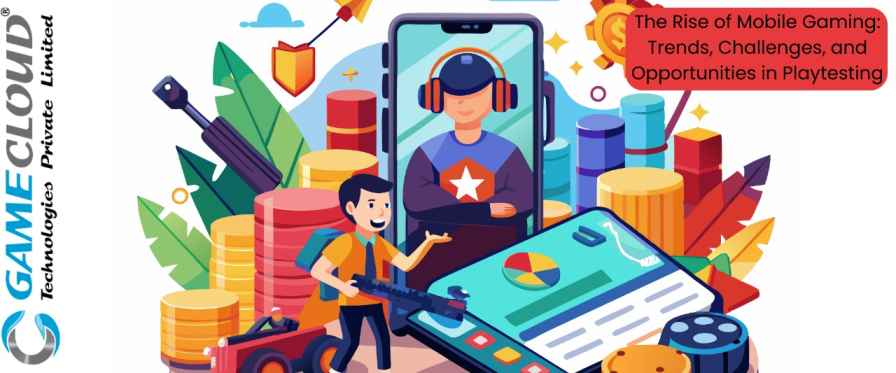
Mobile gaming has surged in popularity, with the industry expected to reach $100.54 billion in 2024 and continue growing at a compound annual growth rate of 10.39% until 2029. This growth is driven by the increasing accessibility of smartphones and the broad appeal of mobile games across various genres and demographics. The most lucrative mobile game genres, based on consumer spending on in-app purchases, include RPGs and strategy games, which alone have generated billions in revenue.
Playtesting holds a crucial role in this expanding market. It ensures that games are engaging, balanced, and free from bugs before they reach consumers. Effective playtesting can greatly enhance player retention and satisfaction, which are vital for a game’s commercial success. As mobile gaming continues to evolve, developers face the challenge of continuously integrating user feedback to improve gameplay and maintain relevance in a highly competitive market.
The Rise of AI and Automation in Mobile Game Playtesting
In the evolving world of mobile gaming, the use of AI in playtesting is a trend that is reshaping how games are developed and refined. AI-driven automation in playtesting has allowed for the streamlining of repetitive tasks, such as regression and performance testing, making the testing process more efficient. By employing AI, developers can automate the testing of multiple gameplay scenarios and quickly identify bugs, glitches, and performance issues that might be overlooked during manual testing.
The incorporation of real-time analytics and data-driven methodologies has further enhanced playtesting, enabling developers to monitor performance metrics like loading times and frame rates as they happen. This allows for immediate adjustments to optimize gameplay, ensuring a smoother player experience across various devices and platforms.
Moreover, the feedback loop from players is now more integral than ever. AI tools facilitate the collection and analysis of player feedback, helping developers to understand player preferences and behavior, which in turn influences game updates and design decisions. This continuous loop ensures that games are not only bug-free but also aligned with user expectations and preferences.
Cross-platform playtesting is another area where AI is making a significant impact, ensuring that games provide a consistent and enjoyable experience across all platforms. This is crucial as the diversity of devices and operating systems can affect gameplay quality. Through AI, developers can simulate and test game performance on various platforms simultaneously, ensuring that all players, regardless of their device, have a seamless gaming experience.
Challenges in Playtesting for Mobile Games
Playtesting for mobile games presents several distinct challenges that developers must navigate to ensure a successful gaming experience across a broad spectrum of devices and user preferences.
One of the primary challenges is managing diverse device compatibility and performance. Mobile games must deliver a consistent experience across a variety of devices with different screen sizes, hardware specifications, and operating systems. This requires rigorous compatibility testing to prevent issues like poor graphics performance, interface scaling problems, or crashes on specific devices.
Balancing user experience with monetization strategies is another significant challenge. Implementing monetization models such as in-app purchases, ads, or subscriptions can affect gameplay and user satisfaction. It’s crucial to test these elements extensively to ensure they do not interrupt the gaming experience or lead to player churn due to intrusive or excessive monetization tactics.
Ensuring accurate testing of multiplayer and online features poses its difficulties as well. Multiplayer games require stable network connectivity and efficient matchmaking systems to provide a seamless experience for all players. Playtesting must cover various network conditions and server loads to verify that the game remains responsive and fair under different scenarios.
Opportunities for Innovation in Mobile Game Playtesting
The rapid evolution of mobile gaming presents numerous opportunities for innovation in playtesting, which are crucial for enhancing game quality and player satisfaction.
One significant innovation is the adoption of cloud-based testing solutions, which streamline the process by allowing games to be tested remotely across multiple devices. This technology not only saves costs but also broadens the scope of playtesting, making it possible to conduct extensive testing without geographical limitations. Cloud gaming platforms offer scalable playtesting capabilities that can adjust to the specific needs of different games, from indie to AAA titles.
Another area of innovation is the use of crowd-sourced playtesting, which utilizes the global gaming community to gather diverse feedback. This method allows developers to obtain insights from a wide range of player demographics and preferences, enhancing the game’s appeal and usability.
Further, implementing machine learning models in playtesting can predict user behavior and game engagement, providing developers with valuable data to refine gameplay mechanics and in-game dynamics. This approach helps in personalizing the gaming experience, making it more engaging for players.
Lastly, leveraging AR and VR in playtesting opens new avenues for exploring innovative game mechanics and interfaces. These technologies provide a more immersive playtesting environment, allowing developers to test and refine complex interactions and user experiences in real-time.
Play, Test, and Earn: Where Your Gaming Passion Meets Rewards
At Gamer Throng, we provide a platform where gamers can earn rewards for playing and sharing feedback on upcoming games. Our mission is to connect developers with passionate players who help shape and enhance the gaming experience. We believe in creating a community where users can explore new titles, contribute valuable insights, and get rewarded for their participation. By joining us, players can turn their passion for gaming into an opportunity to influence future game development and earn real-world benefits.
Conclusion
Playtesting is pivotal in the success of mobile gaming, emphasizing the necessity for ongoing innovation in testing methods. As mobile gaming continues to evolve, the future of playtesting will play a crucial role in shaping the industry, ensuring games meet escalating player expectations and technological advancements.
For Know More Contact-Now
